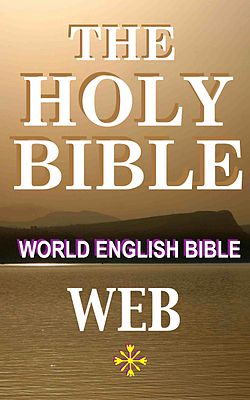| Genesis 1:1-5 (ASV) | Genesis 1:1-5 (WEB) |
|---|
| 1 In the beginning God created the heavens and the earth. 2 And the earth was waste and void; and darkness was upon the face of the deep: and the Spirit of God moved upon the face of the waters. 3 And God said, Let there be light: and there was light. 4 And God saw the light, that it was good: and God divided the light from the darkness. 5 And God called the light Day, and the darkness he called Night. And there was evening and there was morning, one day. | 1 In the beginning, God created the heavens and the earth. 2 The earth was formless and empty. Darkness was on the surface of the deep and God’s Spirit was hovering over the surface of the waters. 3 God said, “Let there be light,” and there was light. 4 God saw the light, and saw that it was good. God divided the light from the darkness. 5 God called the light “day”, and the darkness he called “night”. There was evening and there was morning, the first day. |
| Psalm 1:1-2 (ASV) | Psalm 1:1-2 (WEB) |
|---|
| 1 Blessed is the man that walketh not in the counsel of the wicked, Nor standeth in the way of sinners, Nor sitteth in the seat of scoffers: 2 But his delight is in the law of Jehovah; And on his law doth he meditate day and night. | 1 Blessed is the man who doesn’t walk in the counsel of the wicked, - nor stand on the path of sinners,
- nor sit in the seat of scoffers;
2 but his delight is in Yahweh’s law. - On his law he meditates day and night.
|
| Matthew 1:1-2 (ASV) | Matthew 1:1-2 (WEB) |
|---|
| 1 The book of the generation of Jesus Christ, the son of David, the son of Abraham. 2 Abraham begat Isaac; and Isaac begat Jacob; and Jacob begat Judah and his brethren; | 1 The book of the genealogy of Jesus Christ, the son of David, the son of Abraham. 2 Abraham became the father of Isaac. Isaac became the father of Jacob. Jacob became the father of Judah and his brothers. |
| Romans 3:21-26 (ASV) | Romans 3:21-26 (WEB) |
|---|
| 21 But now apart from the law a righteousness of God hath been manifested, being witnessed by the law and the prophets; 22 even the righteousness of God through faith in Jesus Christ unto all them that believe; for there is no distinction; 23 for all have sinned, and fall short of the glory of God; 24 being justified freely by his grace through the redemption that is in Christ Jesus: 25 whom God set forth to be a propitiation, through faith, in his blood, to show his righteousness because of the passing over of the sins done aforetime, in the forbearance of God; 26 for the showing, I say, of his righteousness at this present season: that he might himself be just, and the justifier of him that hath faith in Jesus. | 21 But now apart from the law, a righteousness of God has been revealed, being testified by the law and the prophets; 22 even the righteousness of God through faith in Jesus Christ to all and on all those who believe. For there is no distinction, 23 for all have sinned, and fall short of the glory of God; 24 being justified freely by his grace through the redemption that is in Christ Jesus; 25 whom God sent to be an atoning sacrifice, through faith in his blood, for a demonstration of his righteousness through the passing over of prior sins, in God’s forbearance; 26 to demonstrate his righteousness at this present time; that he might himself be just, and the justifier of him who has faith in Jesus. |
| Revelation 13:11-12 (ASV) | Revelation 13:11-12 (WEB) |
|---|
| 11 And I saw another beast coming up out of the earth; and he had two horns like unto a lamb, and he spake as a dragon. 12 And he exerciseth all the authority of the first beast in his sight. And he maketh the earth and them that dwell therein to worship the first beast, whose death-stroke was healed. | 11 I saw another beast coming up out of the earth. He had two horns like a lamb, and he spoke like a dragon. 12 He exercises all the authority of the first beast in his presence. He makes the earth and those who dwell in it to worship the first beast, whose fatal wound was healed. |
